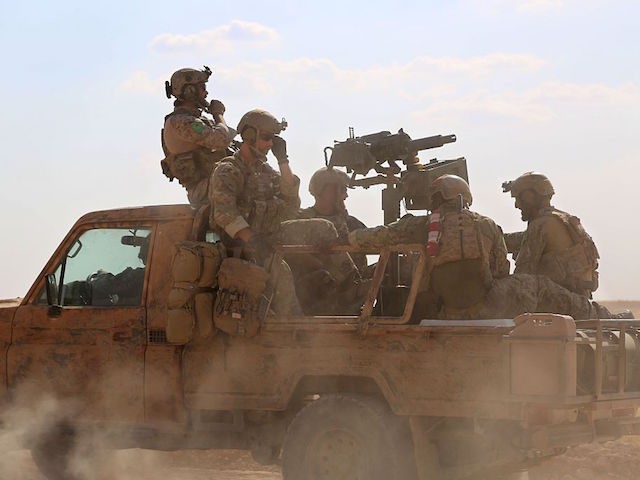WASHINGTON – The commander of U.S. Special Operations Command said that special operations forces are “an approach” short of a heavier military commitment.
“We are an approach short of a lot heavier U.S. military commitment,” Army Gen. Tony Thomas said during opening remarks at the SOCOM Patriot Awards ceremony last month.
Special operations forces have taken on the brunt of the advising mission in Iraq and Syria, in the war against the Islamic State in Iraq and Syria.
They were the first to deploy to Iraq and Syria, and Gen. Thomas’ remarks indicate more such forces could deploy soon. The administration is currently reviewing its plan to defeat ISIS in Iraq and Syria, as well as other terrorists globally.
Officials have not ruled out sending more troops to Iraq or Syria. There are currently 5,262 U.S. forces authorized for deployment to Iraq and 503 for Syria.
There are thousands more deployed on a temporary basis to Iraq, and hundreds more in Syria, that are not part of the official count, due to long-time Pentagon troop-accounting methods.
Special operations forces are currently operating in Afghanistan as part of a counterterrorism mission, as well as in African nations advising local forces in the fight against al-Qaeda and the Islamic State. They also operate in Yemen, where the administration has ramped up airstrikes against al Qaeda in the Arabian Peninsula.
Thomas said special operations forces are not “redlining,” but they are “pushing a hard tempo.”
“We may be making it look easy, it’s anything but easy … We’re not redlining but we’re pushing a hard, hard tempo. There hasn’t been a peace dividend for Special Operations lately and there’s not going to be, more than likely, for the next few years,” he said.
“We’re a valuable commodity that ironically, that keeps this nation from going to war more wholesomely, you know – more completely – with more folks on the ground. I’d like to think we keep the nation from sustaining more casualties by the very nature of our activities,” he added.
The use of special operations forces and drone strikes to keep terrorists at bay began under President Obama, who sought to draw down conventional forces from Iraq and Afghanistan.
He was forced to reverse that trend after ISIS entered Iraq, and the Taliban made a comeback in Afghanistan.
Thomas said he was talking to leaders at the Pentagon and in Congress about how to best use special operations forces.
“Their biggest concern – Secretary Mattis [said] to me the other day, ‘How are we going to slow the tempo down for you? … [Senator Sen. John McCain was] adamant that we are burning SOF too hard: ‘You’re going too fast. How do we throttle this thing down?'” he said.
“It is absolutely a concern of our leadership. We want to be able to control the tempo, the pace, and the prioritization for our special operations forces — that they are being used appropriately, effectively across-the-board. We are not looking to sit back and not be used, but we want to hit that right balance.”

COMMENTS
Please let us know if you're having issues with commenting.